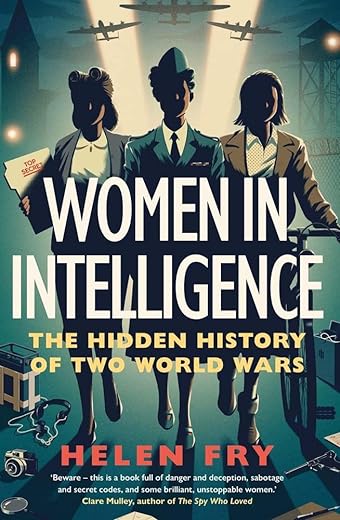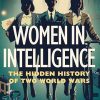Women in Intelligence: The Hidden History of Two World Wars
£19.00£23.80 (-20%)
A groundbreaking history of women in British intelligence, revealing their pivotal role across the first half of the twentieth century
From the twentieth century onward, women took on an extraordinary range of roles in intelligence, defying the conventions of their time. Across both world wars, far from being a small part of covert operations, women ran spy networks and escape lines, parachuted behind enemy lines, and interrogated prisoners. And, back in Bletchley and Whitehall, women’s vital administrative work in MI offices kept the British war engine running.
In this major, panoramic history, Helen Fry looks at the rich and varied work women undertook as civilians and in uniform. From spies in the Belgian network “La Dame Blanche,” knitting coded messages into jumpers, to those who interpreted aerial images and even ran entire sections, Fry shows just how crucial women were in the intelligence mission. Filled with hitherto unknown stories, Women in Intelligence places new research on record for the first time and showcases the inspirational contributions of these remarkable women.
From the twentieth century onward, women took on an extraordinary range of roles in intelligence, defying the conventions of their time. Across both world wars, far from being a small part of covert operations, women ran spy networks and escape lines, parachuted behind enemy lines, and interrogated prisoners. And, back in Bletchley and Whitehall, women’s vital administrative work in MI offices kept the British war engine running.
In this major, panoramic history, Helen Fry looks at the rich and varied work women undertook as civilians and in uniform. From spies in the Belgian network “La Dame Blanche,” knitting coded messages into jumpers, to those who interpreted aerial images and even ran entire sections, Fry shows just how crucial women were in the intelligence mission. Filled with hitherto unknown stories, Women in Intelligence places new research on record for the first time and showcases the inspirational contributions of these remarkable women.
Read more
Additional information
| Publisher | Yale University Press (12 Sept. 2023) |
|---|---|
| Language | English |
| Hardcover | 464 pages |
| ISBN-10 | 0300260776 |
| ISBN-13 | 978-0300260779 |
| Dimensions | 15.88 x 4.45 x 23.5 cm |



by Buzby
Through time, aspects of this book will be updated as more of the wartime files are released into the public domain.
by Robin Joyce
Helen Fry, Women in Intelligence The Hidden History of Two World Wars, Yale University Press, October 2023.
Thank you, NetGalley, for providing me with this uncorrected proof for review.
Helen Fry has achieved two things in writing this book: she has assembled a wealth of information that ensures that women take their place in the history of intelligence, and she has, particularly in the World War two section of the book, delivered some awe-inspiring stories in detail. This is not to say that the earlier information is not awe inspiring- it is – however, the easier access to information in the later period has made given the writing a liveliness that is not so readily apparent in the accumulation of facts in the earlier chapters.
Helen Fry explains the discrepancy in her very informative conclusion. Many of the files associated with women’s intelligence work during World War 1 remain classified. This includes in particular SIS operations which involved men’s work as well. She mentions trailblazers of the period, suggesting that at least some material is available, and hope is held out that more will appear.
In the meantime, this book is a marvel of information. As expected, there is a huge commitment to the women who worked at Bletchley. However, this does not overtake the achievements described by Fry that took place in the various secret services, even the boy scouts and girl guides, and in Britain and overseas. The sexism that dogged the services, as in other aspects of society, is referred too. But so too, is the actions of men who believed that the women in their areas of expertise and command deserved more, and fought for better treatment, pay, conditions and work for women. Fry is meticulous in providing both single and married names for the women she discusses, adding to the ease with which other writers might follow up these women in both their professional and domestic spheres.
The citations are numerous and informative, and the bibliography a dream source of further information. The professionalism of these rounds off an excellent read which is thoroughly engrossing. Thank you, Helen Fry, for an insightful compendium of information about the women who worked in
by English Rose
Fascinating
Definitely worth buying.
Kind Regards
E.R.
by G. Noble
An in-depth look at the roles women played in the British Intelligence services in both World Wars. Far from being confined to being secretaries or typists, sometimes these roles concealed jobs working in decoding, setting up & running spy networks in Europe, & even being parachuted into occupied territory to work undercover. These women were not merely the ‘femme fatales’ of films but hardworking, courageous, intelligent women who put their lives on the line for the Allies.
The author has obviously carried out painstaking research in putting together the stories of these forgotten women. There’s a wealth of information in these pages with probably much more to come if the rest of the files are ever declassified. Some of the stories were staggering in the bravery that these women showed under pressure, saving not only their own lives but the lives of Allied soldiers & other undercover operatives. There were also many who disappeared & it was unknown what had happened to them. It’s a fascinating subject but at times, the writing was a little dry to read with many dates, names etc to remember. Overall it was an informative read & these women deserve to have their stories told & their sacrifices acknowledged.
My thanks to NetGalley & publishers, Yale University Press, for the opportunity to read an ARC. I am voluntarily giving an honest review.
by Viewers
Recently declassified documents and privileged access to a handful of survivors allowed Helen Fry in Women in Intelligence to bring to light the contribution of women to the Allies victory in both World Wars.
Dame Blanche intelligence network played a key role in the Allied victory in WW 1 – inconceivable without female intelligence operators. In WW 2, that pattern repeats itself in Belgium, with MI6’s Clarence network and MI9’s Comet line.
That this lesson was learned, is highlighted by a letter dated 25th January 1944, which refers to preparations for D-Day. Airey Neave at MI9, in charge of the Comet line, points out to Capt. Delloye of Belgian Intelligence, why women can make superior agents.
That Britain, survived the early years of WW1 and WW2 was in large part due to superior intelligence. What made it superior to any of its allies and opponents is revealed here for the first time – the significant role of women.
That married couples would together brief agents shows how British Intelligence understood the pivotal role of women.
This book is a treasure chest of brand-new intelligence research that will be of great value to future historians.
by Curly
The author, no storyteller, inded having no story to tell has managed in 400 pages to produce a virtual telephone directory, boasting a patchy index, with few if any telephone numbers.
by Mrs Roberta M Jones
An excellent book outlining the bravery and importance of women during two world wars operating within secretive organisations across many countries. It is clear that Fry has researched this vast and complex topic thoroughly. If you are interested in history and the importance of a woman’s role within history then this book is definitely well worth reading!